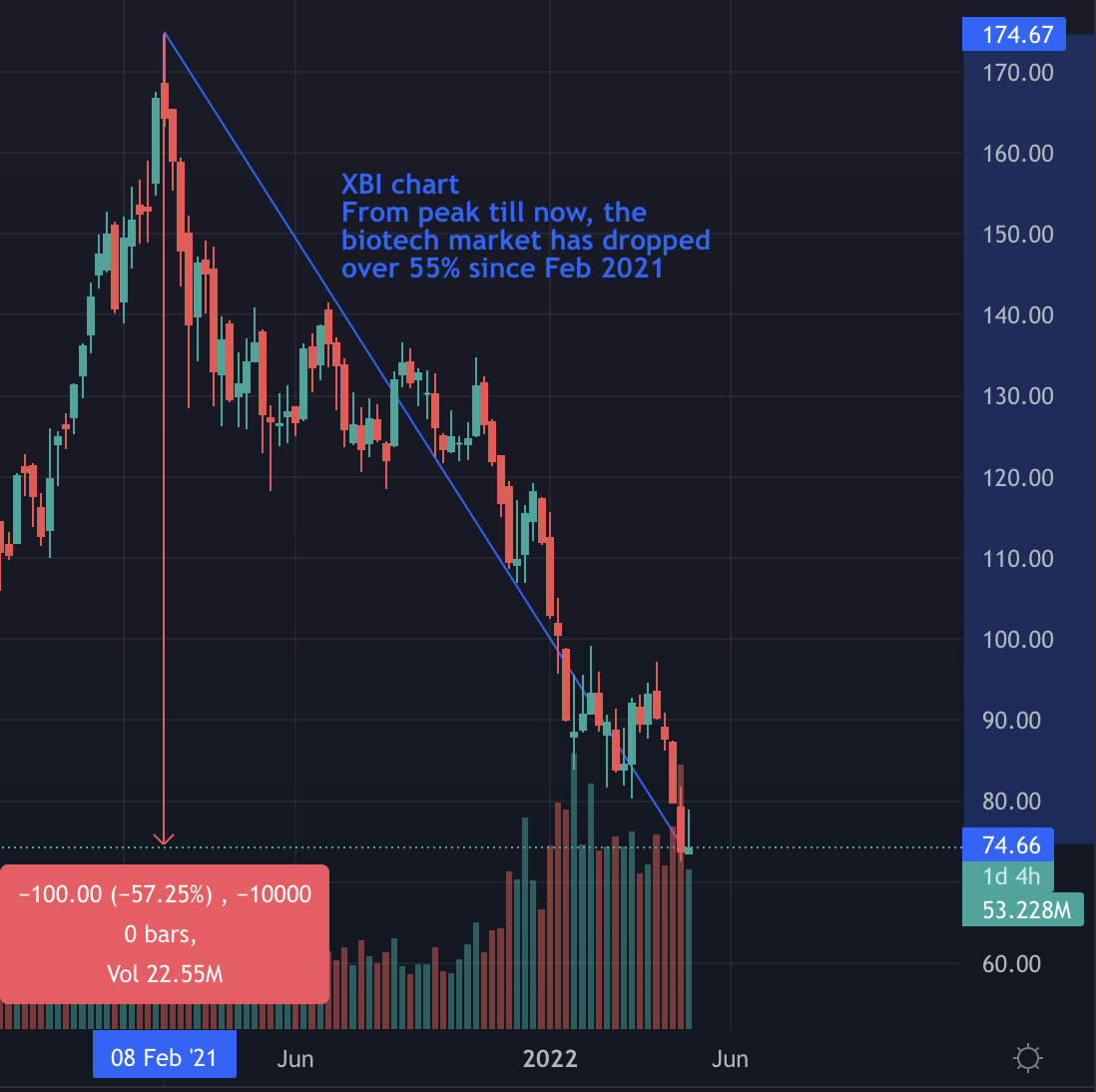
The State of Biotech Today

The state of biotech today:
The state of biotech today.
Went to the Bloom Burton conference the last few days, Canada’s premier healthcare event.
Had a lot of fun and am so grateful to be back to in-person conferences.
Spoke to a lot of people.
Had several convos on the state of biotech market today (May.4.22).
Heard some things I agreed with and others I did not.
Here are my thoughts today and they’re not representative of my firm or anyone who works there.
This is my opinion.
Here we go:
We haven’t seen the bottom.
The market is down over 50% as per the XBI from its peak in Feb 2021, yet we have a long way to go.

I predicted this could happen a year ago because I saw the writing on the wall (article here).
Some of the predictions I was right about, others I wasn’t…yet ;)
Our industry underestimates why we did so well the last few years.
The US Federal Reserve ran the money printer on overdrive since Covid.
Our industry has been directly correlated to the actions of the Fed.
Bay Bridge Bio, which is the most incredible resource on learning biotech, wrote about this recently
The conclusion is the Fed has always come to the rescue of biotech markets in the last decade.
Now that can’t happen. Not with inflation where it is.
Governments around the world spent trillions of dollars on the Covid response, billions of which went to developing new treatments, diagnostics, and helping healthcare systems. (here’s how the US government allocated budget to COVID).
That won’t continue.
You have a lot of negative clinical news.
Tons of failures.
You’ve also seen generalist investors who flocked in 2020 and 2021 for the juicy returns rotate out of the sector.
If you’re a big money manager, why chase a falling knife biotech market when you can get better returns in other sectors like commodities, energy, and real estate?
You can’t raise money on the public markets.
The IPO window is closed.
Many of those companies who raised large series B’s last summer and are burning cash can’t get access to public liquidity, let alone get a valuation jump.
Biotech companies used to get an average $500 million IPO valuation.
Now that the market has dropped in half, they’d be lucky to get a $250M valuation, let alone be able to do an IPO.
Spoke to a CEO at the conference who told me bankers tried to take a company public without raising any new money from public investors and only from existing insiders.
That’s insane.
Now, what if that company has a pre-money of $300M at a Series B?
The crossover investors are not going to get the bump they want.
That hurts their returns.
So growth funds and crossover funds that invest in both public and private are getting crunched.
As of last December, two of the largest public biotech funds that also do private deals, Perceptive Advisors and Orbimed, had lost 30% and 40% respectively in 2021.
The biotech market has dropped further since that time.
So they have to be careful with their money.
They can’t go chasing crazy valuations anymore.
We also haven’t seen an increase in M&A by pharma, even though they have tons of cash on their balance sheet.
Fierce Biotech discussed this in an article at the end of 2021
Why?
A lot of reasons but my sense is pharma is being patient. Endpoints recently wrote about how pharma CEOs are actively looking for new acquisitions, but they’re taking their time
As one of the panelists at the conference put it, ‘they’re waiting for a ripe apple in a sea of bad apples’ and there are a lot of ‘bad’ apples these days.
Why would they go after risky ideas when they can just pay a premium for clinical assets once they’re successful?
Sierra Oncology’s acquisition by GSK is a great example.
In this market, especially with all the new modalities that have come public in the last 2 years, of course they’ll pay a premium for an approved clinical asset.
So there’s likely more down to go.
More people will lose money.
That will eventually trickle down to the private markets, and it already has.
Crossovers who were used to doing crazy Series A rounds can’t anymore so valuations are coming back to earth.
So what now?
Now it’s about survival.
It’s about managing burn.
It’s about raising money when you can.
It’s about making sure you raise at reasonable valuations.
It’s about relentlessly executing on milestones.
The time of easy money is gone.
There are several hundred biotech companies on the public markets that are trading below the cash on their balance sheet.
The market is currently valuing their science and assets as negative.
Some of those will be huge winners.
Most of them will also fail.
That’s the nature of the business.
So what gives me hope?
There are a lot of private dollars out there.
There’s a lot of really high-quality science.
The pace of innovation feels so rapid.
I mean shit, the biotech industry saved the world.
Never forget that.
We did that.
Well, I didn’t do anything, but it was great to watch it from the sidelines.
Innovation working at its finest.
That’s what makes me excited.
Our industry saved the world from even more disasters.
There are many more exciting breakthroughs that will come in the next decade.
It’s why I love what I do. Being a part of the future of healthcare.
But that doesn’t mean it won’t be a bumpy ride along the way.
So be careful. Don’t overextend yourself. Get back to the fundamentals.
Execute on your vision.
That’s my assessment of the state of biotech today.